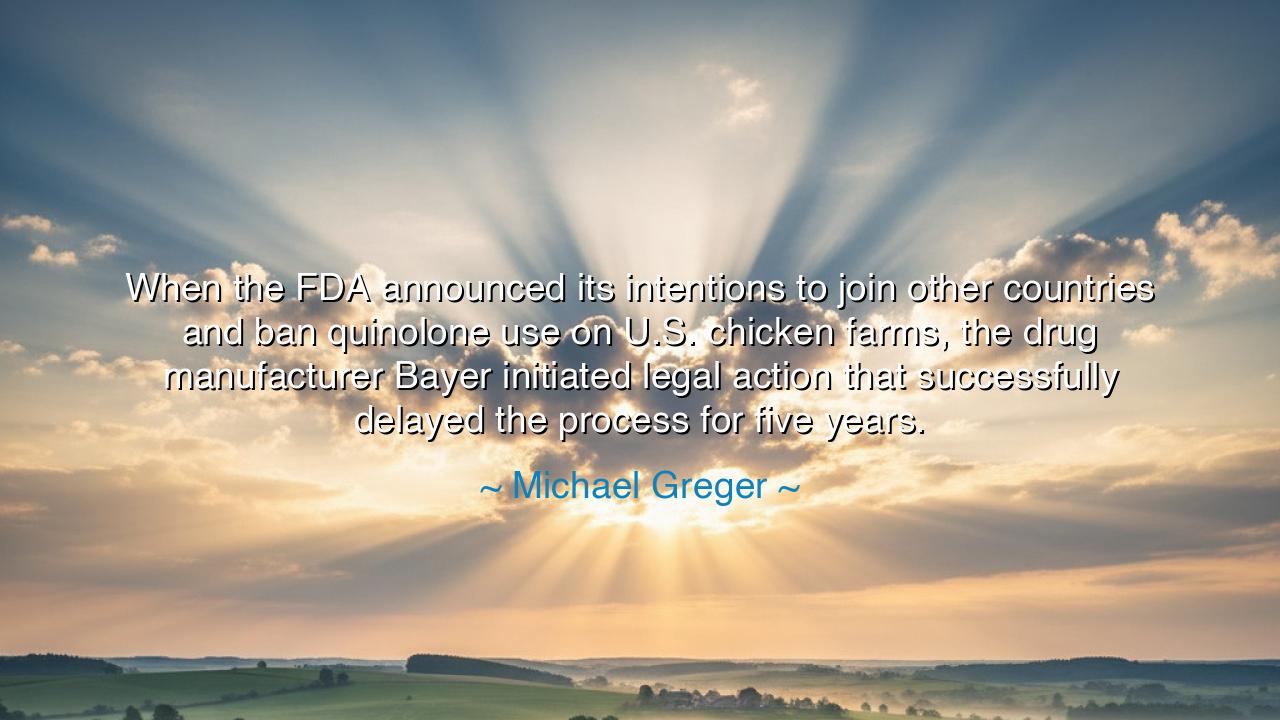
When the FDA announced its intentions to join other countries and
When the FDA announced its intentions to join other countries and ban quinolone use on U.S. chicken farms, the drug manufacturer Bayer initiated legal action that successfully delayed the process for five years.






In the annals of human health and commerce, there lies an eternal tension between profit and public welfare, between the swift allure of gain and the enduring duty of responsibility. Michael Greger’s words illuminate this struggle: “When the FDA announced its intentions to join other countries and ban quinolone use on U.S. chicken farms, the drug manufacturer Bayer initiated legal action that successfully delayed the process for five years.” In these lines rests a meditation on power, delay, and the consequences of placing corporate interests above the well-being of the people. For the law, though noble, can be strained by wealth and influence, and time becomes a silent accomplice to inaction.
From the markets of ancient Rome to the trade empires of medieval Europe, history is replete with tales of those who sought advantage at the expense of the public. In Greger’s account, we witness a modern echo of this age-old phenomenon: a corporation, endowed with resources and legal acumen, used litigation to stall regulations meant to protect health, demonstrating that the path of right action is often obstructed by the machinery of influence. Here, the wisdom of the ancients reminds us that vigilance is required, for the wheels of justice turn slowly when faced with formidable opposition.
Consider the historical example of the early regulation of food safety in the United States. In the early 1900s, Upton Sinclair’s revelations in The Jungle exposed unsanitary conditions in meatpacking plants. The call for reform was met with resistance from powerful industry interests, delaying meaningful change. Only through persistent advocacy and public awareness did the Pure Food and Drug Act come into being. Just as Sinclair revealed the peril of unchecked industry, Greger highlights that even measures designed to protect the public, like banning quinolones, can be deferred when legal maneuvering outweighs immediate moral duty.
The use of quinolones in poultry is not merely an abstract regulatory concern. These drugs, intended to treat bacterial infections in animals, carry the weighty risk of breeding antibiotic resistance, a threat that extends to human health. When Bayer delayed the ban through litigation, five precious years passed in which resistant strains could flourish, silently undermining the efficacy of medicines essential to the treatment of serious infections. Greger’s statement thus illuminates a profound truth: the consequences of legal delay are not abstract—they are measured in human lives and the erosion of public safety.
In reflecting upon this, we find the enduring lesson of accountability. Power, whether wielded by corporations, governments, or individuals, is most just when tempered by foresight and moral responsibility. Greger’s recounting of the FDA’s thwarted intentions urges us to recognize that the guardians of public health must be steadfast, vigilant, and proactive, lest profit eclipse prudence. The ancients would have nodded in solemn agreement: a society that allows delay in the face of danger risks the very foundations upon which it stands.
For contemporary citizens and leaders alike, this episode offers practical guidance. Stay informed, question authority, and hold both industry and regulators accountable. Support transparency in decision-making, advocate for timely enforcement of health protections, and recognize that legal victories for profit are not necessarily victories for justice. When the mechanisms of delay are exposed, the public gains the power to demand swifter action, reminding those in positions of authority that their ultimate duty is to the people, not to the ledger.
The moral resonance of Greger’s words extends beyond pharmaceuticals or agriculture. It speaks to the broader principle that delays in implementing protective measures, whether due to legal challenges or bureaucratic inertia, carry tangible costs to human welfare. Awareness, persistence, and collective action become the tools by which societies can guard against the slow erosion of safety and the quiet triumph of expedience over prudence.
Thus, in the final reckoning, the tale of quinolones and the FDA is timeless: regulation without enforcement is a promise unfulfilled, and vigilance is the price of health and justice. Let those who wield authority remember that the consequences of delay are not measured merely in legal briefs or financial statements, but in the very fabric of life itself. And let all who hear this lesson carry forward the truth that the protection of society demands courage, persistence, and the unwavering prioritization of the common good over transient gain.






AAdministratorAdministrator
Welcome, honored guests. Please leave a comment, we will respond soon